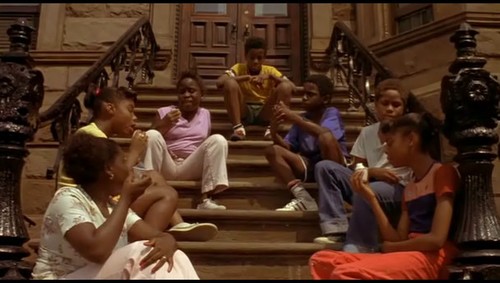
Spike Lee's Crookyln gives the viewer a look into the life of an African American family, living in the infamous Bedford Stuyvesant neighborhood of New York City. Initially when I watched this film I thought back to another one of Lee's movies: Do the Right Thing, which I had seen in my English class last year. The primary reason for my discontent with this film was that it lacked a true storyline, and Crooklyn seemed to have the same problem. This actually makes me think of Badlands as well, which I also criticized for not having much of a plot. As I said in my blog post: "Things happen, people go places and do things, say things, but I can't help but wonder what the point of it all is." I felt a similar way with Crooklyn, but then I also realized something. Maybe that is the whole point of it all. Spike Lee intended to show what life is like for a typical black family in Bed-Stuy.
Not only does this film remind me of the aforementioned titles, but a tv that I watched a few years ago popped in my head as well: Chris Rock's Everybody Hates Chris. Much like Crooklyn, this series takes the viewer into the life of a family residing in this community, highlighting the hardships that they faced. Both families were large, often relied on food stamps, and were treated poorly by white people. The parents often argued, as well as the brothers and sisters. Both Chris Rock and Spike Lee did a fantastic job of portraying the average lifestyle in this trouble-ridden district. Crooklyn mainly focuses on Troy, who can be considered the oddball in her family. The cinematography communicated this well by showing shots of her sitting a great distance away from everyone else during meal times, and of her being sent to the store by herself. Clearly she is more mature than her argumentative brothers, which explains why she is given these tasks. This also makes me think of how different life is in the inner city compared to that of the suburbs, and also the variations between this decade and the 1970s. Nowadays, it would be concerning to see a young child walking the streets by themselves, but back then I guess it wasn't a big deal.
As the movie progresses, the Carmichael family heads down south for a vacation. They leave their urban hometown for a much more relaxed rural atmosphere, which Troy is not accustomed to. She definitely wasn't happy to be there from the beginning, and was even more put off by the fact that she had to stay there for a few days after the rest of her family went back home. Coming from the suburbs myself, I would've been more than happy to leave the hustle and bustle of the city for the lush green landscape of the south, but remember, the city is where Troy grew up. It was all she knew, all she was used to. For her, the city was the place to be - the action, the drama, the excitement. Her aunt's home was just too boring. As the period came to an end, she was finally on her way back home. I bet she was happy.
No comments:
Post a Comment